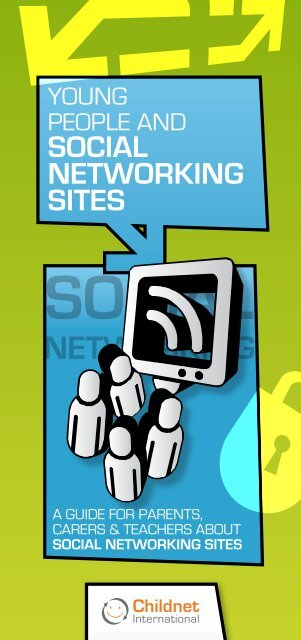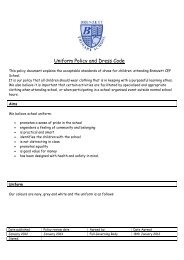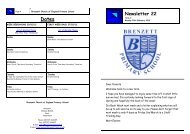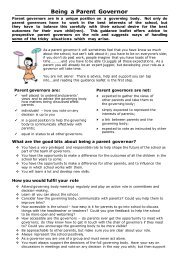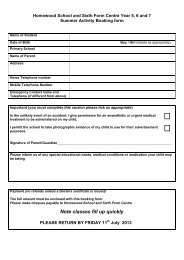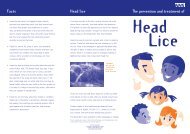Young People & Social Networking Sites - Brenzett Primary School
Young People & Social Networking Sites - Brenzett Primary School
Young People & Social Networking Sites - Brenzett Primary School
You also want an ePaper? Increase the reach of your titles
YUMPU automatically turns print PDFs into web optimized ePapers that Google loves.
YOUNG<br />
PEOPLE AND<br />
SOCIAL<br />
NETWORKING<br />
SITES<br />
A GUIDE FOR PARENTS,<br />
CARERS & TEACHERS ABOUT<br />
SOCIAL NETWORKING sites
<strong>Social</strong> networking sites, such as MySpace, Bebo<br />
and Facebook, are very popular with children,<br />
even those as young as 8 and 9. These sites allow<br />
children to be incredibly creative online, keep in<br />
touch with their friends and express themselves<br />
using a whole range of different media and<br />
applications such as video, photos, music,<br />
and chat.<br />
However, it’s important to recognise that while these are fun<br />
and offer great possibilities for children, there are potential risks<br />
including cyberbullying, contact by adults with a sexual<br />
interest in children and the misuse of personal information.<br />
While most social networking sites stipulate<br />
a minimum user age of 13 or 14, users are<br />
often younger than this and as a parent,<br />
carer or teacher it’s really important that you<br />
familiarise yourself with these services so that<br />
you can help to support your children in<br />
using them in a safe and constructive way.<br />
<strong>Social</strong> networking sites, alongside sites which enable users to put<br />
up their own pictures, text and videos (known as user-generated<br />
content) and blogging sites, are part of a social and technological<br />
revolution that is known as Web 2.0. Web 2.0 is characterised by<br />
the ease with which anyone can produce and publish their own<br />
content and link with others.<br />
<strong>Young</strong> people especially love this new environment because<br />
they can have a powerful voice to express their identity and<br />
opinions and many are using it to good effect. For example, some<br />
musicians and bands have launched themselves entirely on the<br />
strength of this new stage. And all this is for free and with just one<br />
password – is it any wonder why young people love it?
PRIVATE OR PUBLIC<br />
SOCIAL LIFE?<br />
What sometimes appears as a private space for a child can<br />
become public very quickly and this blur between public<br />
and private expression can potentially put a child at risk<br />
in two main ways:<br />
content:<br />
Children creating or posting inappropriate, offensive or even illegal content<br />
in their or others’ Web pages could get them into trouble with their school,<br />
friends, and even the police, depending on the nature of the material.<br />
Content posted to the Web can be copied, altered and reposted by anyone<br />
and it’s very difficult to ‘take back’ what may be later regretted. This can<br />
damage reputations as well as future prospects.<br />
CONTACT:<br />
Children can also put too much personal information in these sites, exposing<br />
their information to adults with a sexual interest in children. Posting or<br />
chatting about personal details might enable someone to identify and<br />
contact your child online or in person. There is also the more likely risk<br />
of cyberbullying with young people intentionally harming another<br />
person online.<br />
It is not easy talking to a young person about their social<br />
networking online or offline. <strong>Young</strong> people often think of these<br />
sites as their private domain, in much the same way as they would<br />
a personal diary and address book.<br />
However because of the public nature of this environment and<br />
because young people have been hurt by inappropriate behaviour<br />
in these spaces, it is important that they understand the risks and<br />
are able to safeguard themselves with the help and support<br />
of others.
Here are 5 Ps that should be considered about<br />
social networking sites.<br />
1. POSITIVE:<br />
Stay positive about social networking sites – try to strike a balance between<br />
educating children and young people to behave safely and trusting them to<br />
get on with it. Get involved – ask them how to create a profile, get them to<br />
show you theirs and ask them to add you to their friends list!<br />
2. PRIVACY:<br />
Make sure that children know how to protect themselves on social<br />
networking sites through the tools provided. It’s important to discuss the<br />
value of privacy with children. Encourage your child to keep their passwords<br />
private and work with them to check the privacy settings on their account<br />
which limit how much of their information can be seen by others – for<br />
example, encourage your child to change their settings to private so that<br />
only people they allow can see what they post and comment on their space,<br />
rather than public which leaves their site open to be viewed by anyone.<br />
3. PHOTOS:<br />
It’s natural that children will want to include a photo on their site or profile,<br />
but help them think about the implications of posting photos and what is<br />
suitable. It is important to think about the type of picture and the kind of<br />
attention it might attract, the information it could divulge and who could see<br />
it. Suggest that your child ask permission of other people in the images that<br />
they post. Also, be aware that photos can be easily copied, changed, shared,<br />
used elsewhere, and can potentially stay online forever. One question to ask<br />
your child is “would they want a future employer to see this photo?”<br />
4. POSTINGS:<br />
The ability to interact with this media and comment on other people’s sites<br />
is part of what makes these sites so attractive. However, make sure you<br />
help your child to think before they post. Set some ground rules about what<br />
is and isn’t OK to say in a blog or profile. This relates to what the child says<br />
about others as much as about themselves. What starts off as a joke or<br />
gossip can quickly escalate to cause real pain which cannot be taken back.<br />
5. POLICE:<br />
It’s really important that you encourage your child to tell you about<br />
inappropriate or illegal activity they may come across. If you suspect your<br />
child is being groomed by someone with a sexual interest in children, it’s<br />
vital that you help them keep a copy of the offending images or messages<br />
and report them to the police via the Child Exploitation and Online Protection<br />
Centre website www.ceop.gov.uk/reportabuse. If they are being harassed<br />
by another user, report that person’s screen name to the SN provider which<br />
hopefully will act on violations to its terms of service.
SMART RULES<br />
Childnet has produced 5 key SMART rules which<br />
remind young people to be SMART online.<br />
It can be helpful to go through these tips with<br />
your children.<br />
s<br />
m<br />
a<br />
r<br />
SAFE: Keep safe by being careful not to give<br />
out personal information, – such as your full name,<br />
e-mail address, phone number, home address,<br />
photos or school name – either to people you are<br />
chatting with online or by posting it online where<br />
other people can see it.<br />
MEETING: Meeting someone you have only<br />
been in touch with online can be dangerous. Only<br />
do so with your parents’ or carers’ permission and<br />
even then only when they can be present.<br />
ACCEPTING: Accepting e-mails, IM<br />
messages, or opening files, pictures or texts<br />
from people you don’t know or trust can lead to<br />
problems – they may contain viruses or<br />
nasty messages!<br />
RELIABLE: Information you find on the<br />
internet may not be true, or someone online may be<br />
lying about who they are.<br />
t<br />
TELL: Tell your parent, carer or a trusted<br />
adult if someone or something makes you feel<br />
uncomfortable or worried, or if you or someone you<br />
know is being bullied online.
FURTHER RESOURCEs<br />
>> www.childnet.com/blogsafety<br />
The Childnet International website gives internet safety<br />
advice and links for young people, parents, teachers and<br />
other organisations.<br />
>> www.digizen.org/socialnetworking<br />
A new report by Childnet providing teachers with a<br />
comprehensive guide to social networking services.<br />
>> www.childnet.com/music<br />
Childnet’s leaflet on <strong>Young</strong> <strong>People</strong>, Music and the Internet has<br />
concise information to help parents, carers and teachers get up<br />
to speed about online music and the legal issues raised when<br />
copyrighted music is used on social networking sites.<br />
YOUNG PEOPLE,<br />
MUSIC &<br />
T H E I N T E R N E T<br />
>> www.chatdanger.com<br />
Chatdanger is a site all about the potential dangers on<br />
interactive services online like chat, IM, online games,<br />
e-mail and on mobiles. Read true stories and find out how<br />
to chat safely.<br />
CHATDANGER.COM<br />
>> www.connectsafely.org<br />
A US-based resource site and interactive forum where parents,<br />
teens, educators, and experts can discuss safety on the fixed<br />
and mobile social Web.<br />
>> www.ceop.gov.uk<br />
The Child Exploitation and Online Protection (CEOP) Centre’s<br />
website houses a range of information on how to stay safe<br />
online. It includes a unique facility that enables parents and<br />
young people to make reports of actual or attempted<br />
abuse online.<br />
>> www.inhope.org<br />
This site gives details of national child pornography hotlines in<br />
countries around the world.<br />
This guide for parents has been written by the children’s charity<br />
Childnet International in partnership with Net-Family-News.org and<br />
SafeKids.com. The views of this document are solely those of Childnet.<br />
Childnet is a non-profit organisation working in partnership with others to help<br />
make the internet a great and safe place for children. Registered as a charity in<br />
the UK (No 1080173) See www.childnet.com for full details.<br />
Copyright Childnet International 2008


